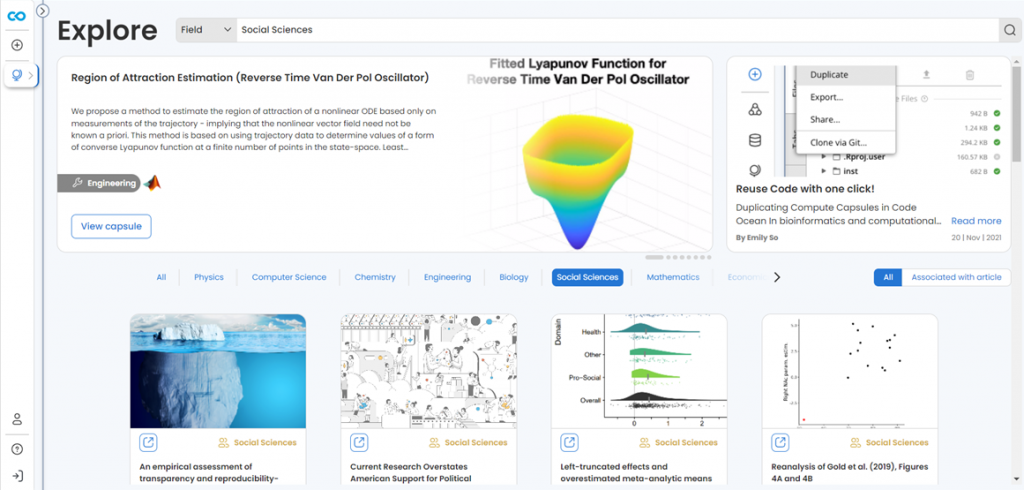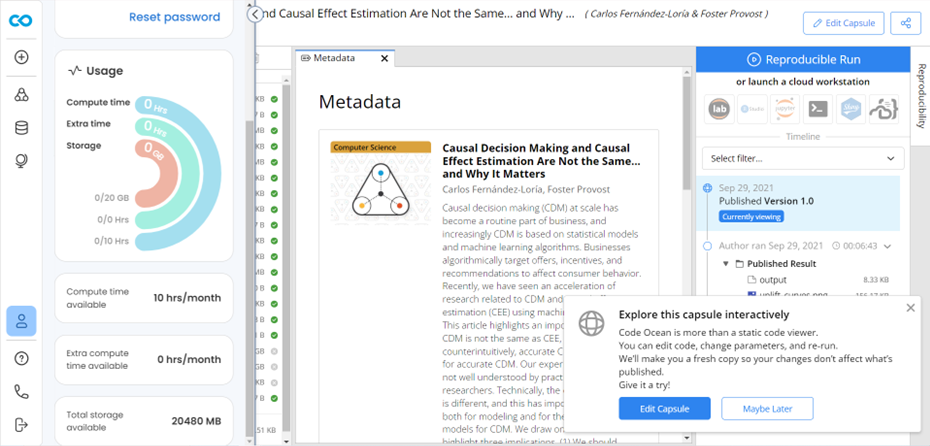
When seeking out recipes, we would want to use those that come with clear steps and measures, and those that have been tested by many and produced consistent good results. The same goes for research code.
Reproducibility is one of the key elements underpinning scientific research. However, there are many challenges and obstacles in relation to research reproducibility. In research fields and studies where custom coding is involved, this issue appears more pressing: an update of a R package or even the same software running in different operating systems may lead to a reproducibility crisis. Although at times research results could be replicated with additional code cleaning, inadequate details and documentation would undermine the scientific value of the original research.
In this week's Research Bridge post, let's use Code Ocean as an example to demonstrate how an open code sharing platform could provide solutions and shed light on better computational research across different subject areas.
What is Code Ocean?
Code Ocean is a one-stop open platform for researchers to create, organize and share code and data. All works on Code Ocean are stored as "compute capsules" in the cloud. Researchers and their collaborators can run and replicate the codes via the capsules in any computers without any installation and setup. They can start the project from scratch or duplicate published capsules. Besides SciTech capsules, there are also many from economics, finance and social sciences fields which you can search and reuse on the platform (Figure 1).

Figure 1. Explore existing capsules in Code Ocean
Compute Capsule
A Compute Capsule is an executable research package which consists of codes, data and the computing environment. With no configuration required, researchers can select the computing environment such as Python, R Studio, MATLAB and STATA for their projects. To ensure the computational reproducibility, all capsules are verified before publication. As codes, data and the computing environment are preserved as capsules in the cloud, the analysis and results can be easily rerun and reproduced by anyone with web browser anytime and anywhere (Figure 2).

Figure 2. Running a compute capsule in Code Ocean.
What's Covered Under a Free Account?
Once you've registered on Code Ocean, you can explore and rerun different capsules in Code Ocean Explore. You can amend the codes or rerun the capsules using a different dataset. For the free account registered with academic email, there are 10 computing hours per month and 20GB for data storage. You can create as many capsules as you want if it does not go over the limit. The time you spend editing and reading the codes does not count towards computing hours.
Consideration on Shareability, Traceability, & Reproducibility
Code Ocean is an open platform with no lock-in, you can export your code and data anytime. You can collaborate with internal or external researchers by controlling the private capsule access right. Because of its power of reproducibility, some journals (e.g. Nature Biotechnology) have piloted trial with code ocean for custom code peer review process.
The published compute capsules are with open access and DOI assigned. As it is a good practice to release custom code for readers, you can easily share the capsules by inserting the DOI links or embedding the Code Ocean widgets in your research articles.
Versioning feature helps keep track of the code updates. With the same computing environment, other users can run or duplicate your code without any installation and setup. When your code is duplicated, the attribution in the duplicated capsule will be automatedly set as you, the original author. It will enhance the shareability, traceability and reproducibility of your research output, which is also in alignment with the UNESCO Recommendation on Open Science.
Related Resources
- Tools for Open-Science Research (Library Guide)







